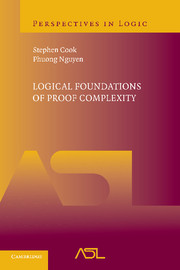Book contents
- Frontmatter
- Contents
- PREFACE
- CHAPTER I INTRODUCTION
- CHAPTER II THE PREDICATE CALCULUS AND THE SYSTEM LK
- CHAPTER III PEANO ARITHMETIC AND ITS SUBSYSTEMS
- CHAPTER IV TWO-SORTED LOGIC AND COMPLEXITY CLASSES
- CHAPTER V THE THEORY V0 AND AC0
- CHAPTER VI THE THEORY V1 AND POLYNOMIAL TIME
- CHAPTER VII PROPOSITIONAL TRANSLATIONS
- CHAPTER VIII THEORIES FOR POLYNOMIAL TIME AND BEYOND
- CHAPTER IX THEORIES FOR SMALL CLASSES
- CHAPTER X PROOF SYSTEMS AND THE REFLECTION PRINCIPLE
- APPENDIX A COMPUTATION MODELS
- BIBLIOGRAPHY
- INDEX
CHAPTER X - PROOF SYSTEMS AND THE REFLECTION PRINCIPLE
Published online by Cambridge University Press: 06 July 2010
- Frontmatter
- Contents
- PREFACE
- CHAPTER I INTRODUCTION
- CHAPTER II THE PREDICATE CALCULUS AND THE SYSTEM LK
- CHAPTER III PEANO ARITHMETIC AND ITS SUBSYSTEMS
- CHAPTER IV TWO-SORTED LOGIC AND COMPLEXITY CLASSES
- CHAPTER V THE THEORY V0 AND AC0
- CHAPTER VI THE THEORY V1 AND POLYNOMIAL TIME
- CHAPTER VII PROPOSITIONAL TRANSLATIONS
- CHAPTER VIII THEORIES FOR POLYNOMIAL TIME AND BEYOND
- CHAPTER IX THEORIES FOR SMALL CLASSES
- CHAPTER X PROOF SYSTEMS AND THE REFLECTION PRINCIPLE
- APPENDIX A COMPUTATION MODELS
- BIBLIOGRAPHY
- INDEX
Summary
An association between Vi and the proof system (for i ≥ 1) is shown in Chapter VII by the fact that each bounded theorem of the theory Vi translates into a family of tautologies that have polynomial-size proofs. Our theories and their associated proof systems are more deeply connected than as shown by just the propositional translation theorems. In this chapter we will present some more connections between the proof systems, their associated theories and the underlying complexity classes.
In general, for each proof system F we study the principle that asserts that the system is sound, i.e, that formulas that have F-proofs are valid. This is known as the Reflection Principle (RFN) for F. We will show in this chapter that the theories Vi and TVi prove the RNF for their associated proof systems when the principles are stated for formulas. Together with the Propositional Translation Theorems, these show that the systems and are the strongest systems (for proving formulas) whose RFN are provable in the theories Vi and TVi, respectively.
A connection between a propositional proof system F and the complexity class C definable in the theory T associated with F will be seen by the fact that the Witnessing Problem for F is complete for C. Recall Theorem VII.4.13 which shows that the Witnessing Problem for (and equivalently for eFrege) are solvable by a polytime algorithm.
Information
- Type
- Chapter
- Information
- Logical Foundations of Proof Complexity , pp. 363 - 444Publisher: Cambridge University PressPrint publication year: 2010
